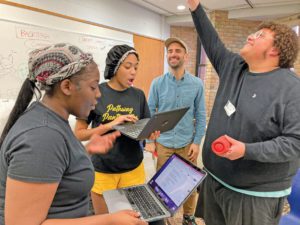In his eleven years at CHS, Strassel taught acting and produced thirty-three shows for the school’s Community Ensemble Theatre. He was able to work boldly, even writing and directing a musical send-up of Trump education secretary Betsy DeVos.

Students Ariyanna Banks and Antania Harris rehearse with acting teacher Quinn Strassell and director Shane Collins. Strassel and students wrote the first show for the Actors Studio at Pathways, A Mind from the Tip of a Cloud. | Photo: Cameron Graham
Strassel visited other area high schools to teach acting: Pioneer, Huron, Skyline, and Pathways to Success. Pathways—an alternative school formed in 2014 by merging Ann Arbor Tech and the Roberto Clemente Student Development Center—offers small classes and increased teacher support for students who struggle with economic hardship and low self-esteem.
When Covid hit and classes moved online, “I was seeing the kids in their homes,” Strassel recalls. “It became clear to me there were a number of kids with a lot of talent who didn’t seem to have an outlet for that talent.”
So in 2020, Strassel left CHS to develop the Actors Studio at Pathways.
At Community, Strassel says, students would get rides to rehearsal, after having good meals. At Pathways, he has to help find ways to get them to rehearsals and make sure they aren’t too hungry to work. With a crock pot and electric grill, he makes simple meals, and someone from the cafeteria brings leftover fruits to rehearsals.
Covid made putting on a play impossible, so he mobilized students to build a soundproof recording studio. “We framed it with wood, then added insulation and drywall,” Strassel says. The district provided computers with recording software.
“It turned out to be a great way to tap into their passions,” he says. “A lot of my students are interested in hip-hop.” Last year, after the program invested in cameras, students went outside and shot footage that became a video. In Voices from the Path, students describe dreams that range from making a horror movie to developing video games to earning a stable income and just being happy.
“Building the recording studio allowed the kids to have success,” Strassel says. “At Community, you have more kids who have had success at school. It’s easier for them to take risks and do challenging work.
“At Pathways, we struggle with attendance. Asking them to stay after school is a big ask. Some are taking care of siblings or older folks or have jobs. It’s important for me to create a family atmosphere.
“The challenge is to get kids to show up and to help them feel motivated and to see the power and spark they have within themselves. Theater is an art form that requires people to show up. I didn’t realize how important it would be to make a connection with parents and guardians and navigate the logistics.”
Strassel graduated from Ypsilanti High, got a degree in theater performance at the U-M, and married his high school sweetheart: Adrienne Pisoni, a U-M musical theater grad who is now a therapist. He picked up a teaching certificate at Eastern, then moved to New York City, where he taught in a Latino neighborhood in Brooklyn. He added an MA in broadcast journalism at Boston University and was interviewing bands for a music website there when a teaching position opened up in Ann Arbor.
“We are so lucky to have Quinn and his passion and his investment and his spirit,” says Kristal Jaaskelainen, Pathways’ lead teacher. “What he’s building is bigger than himself. It gives students a voice. They haven’t had an opportunity to have their voices heard.”
Strassel has applied for grants to help fund the program. A CHS parent organized a fundraiser that allowed him to purchase lighting equipment.
And now, for the first time, Strassel can present live theater at Pathways. He hired one of his former students at Pioneer, Shane Collins, “a young Black man who has a voice and vision I don’t have,” to direct and to help students write A Mind on the Tip of a Cloud, a play about a girl growing up (see Events, Dec. 9–10).
He recruited adults and children to appear in the intergenerational play and enlisted local artists, including Mark Tucker, the U-M art professor behind FestiFools. “We’re building a giant glowing cloud to hang above the stage,” says Strassel, who serves as assistant director and tech director.
“The arts allow us to talk about things that are really difficult to talk about,” he reflects. “There’s something magical when you turn off the lights in the theater and everybody allows themselves to go on a journey.”
“This is just the beginning,” says Jaaskelainen, about Strassel’s work at Pathways. “I can’t wait to see where it goes.”